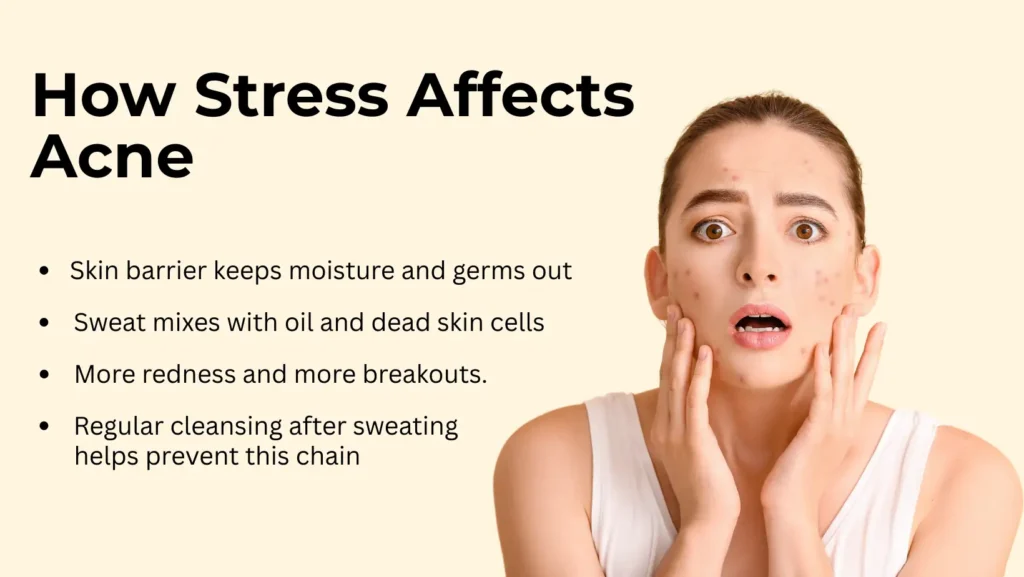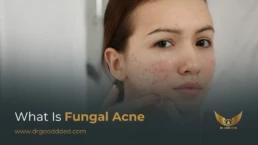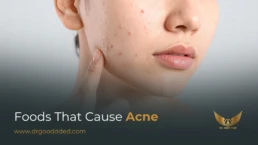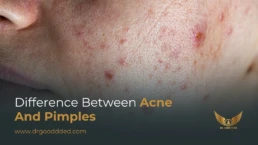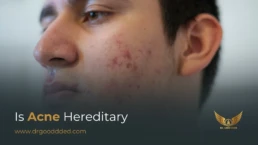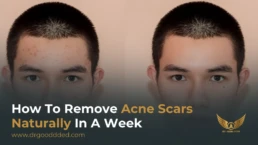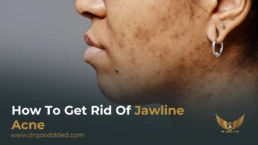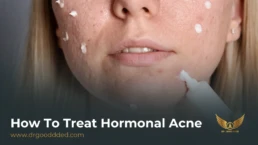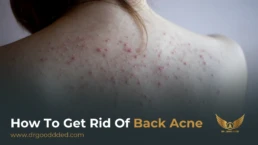Yes. Stress can worsen existing acne and trigger new breakouts by raising hormones and inflammation. You may not get acne from stress alone, but stress makes acne worse for many people.
Table of Contents
ToggleStress And Acne Connection
Stress affects your body in many ways. It raises the hormone cortisol. Cortisol makes your skin’s oil glands produce more oil. Extra oil can clog pores. Clogged pores let bacteria grow and cause pimples. This is a main reason stress causes acne. Studies link higher stress to worse acne.
When you feel stressed, your nervous system also signals the skin. These signals boost inflammation. Inflammation makes pimples red and painful. If you already have acne, stress often makes it worse. Major health centers also note this link.
Stress changes how you act too. You may touch your face more. You may sleep less. You may eat more sugar. These habits feed acne. So the stress and acne connection works through both biology and behavior.
How Stress Hormones Increase Oil Production
Cortisol and other stress hormones tell sebaceous glands to make more sebum (skin oil). More sebum mixes with dead skin cells. Together they block pores. When a pore blocks, bacteria can grow inside. This leads to whiteheads, blackheads, and inflamed pimples.
Example: before a big test you feel anxious. Your body makes cortisol. After a few days you notice new pimples. That timing fits the hormone effect.
Why Cortisol Triggers Inflammation In The Skin
Cortisol does two things at once. It raises oil and it shifts immune signals. The immune system becomes more likely to release inflammatory messengers. These messengers make pimples red and sore. The skin also heals slower under stress. Slower healing means acne lasts longer and can leave marks.
Stress-Related Habits That Worsen Acne (Picking, Lack Of Sleep)
Stress can push you into habits that harm skin.
- You pick or squeeze pimples. This spreads bacteria and causes scarring.
- You skip cleansing or use heavy makeup to hide spots. That clogs pores.
- You sleep less. Poor sleep raises inflammation and slows repair.
- You eat comfort foods with more sugar. High sugar may raise insulin-like growth factor. That can raise oil production.
Fixing these habits helps reduce breakouts, even when stress remains.
Stress Acne Symptoms
Recognizing stress-related acne helps you treat it correctly. Stress acne often starts fast. It looks red and inflamed. You may feel pain in the bumps. The jawline, cheeks, forehead, and back are common places.
If you track your life, you can link breakouts to stressful events. Many people notice more pimples during deadlines, family problems, or illness.
How Stress Acne Looks Compared To Hormonal Acne
Hormonal acne often follows monthly cycles in people who menstruate. It often appears on the lower face and jawline. Stress acne can look similar. The difference lies in timing. Stress acne flares quickly when stress rises. Hormonal acne shows more regular timing. Both types can cause cysts in severe cases. A doctor can help tell them apart.
Sudden Breakouts During Emotional Stress
Short bursts of emotional stress can cause sudden breakouts. For example, a major argument or an exam can trigger new pimples within days. Chronic stress keeps the skin in a proinflammatory state. That leads to long periods of worse acne. Clinical studies report stronger acne in people with higher stress scores.
Stress-Related Flare-Ups On Face, Jawline, And Back
You may notice patterns. The forehead often breaks out when you sweat more. The jawline breaks out with hormonal shifts and stress. The back breaks out with sweat and friction from clothing. These areas reflect how sweat, oil, and pressure raise acne risk.
How Stress Affects Acne
Stress works on many levels. It changes hormones and immune signals. It raises oil, sweat, and bacteria. It also slows healing.
Effects Of Chronic Stress On Skin Barrier
Your skin barrier keeps moisture in and germs out. Chronic stress damages this barrier. A weak barrier dries and flakes. It also allows more irritants to reach deeper skin. Damaged barrier means more redness and more breakouts.
Increased Sweat And Bacteria Buildup
Stress raises heart rate and sweat . Sweat mixes with oil and dead skin cells. If you do not wash sweat off, pores can clog. Bacteria then multiply and cause inflammation. Regular cleansing after sweating helps prevent this chain .
Why Stress Delays Skin Healing
Stress shifts resources in your body away from repair. Cell turnover slows. Collagen formation drops. Pimples take longer to heal. Marks and scars stay longer. Treating inflammation early limits damage.
Why Stress Triggers Acne
The main drivers of stress that causes acne are
Oil Gland Overactivity Caused By Cortisol
Cortisol activates oil glands. Extra sebum clogs pores. That leads directly to acne formation. Thus acne spreads through increased oil.
Immune Response Changes During Stress
Stress changes immune function. The skin shifts toward inflammation. Inflammation turns small clogs into painful pimples.
Poor Sleep And Diet Worsening Breakouts
When you lack sleep, you raise stress and inflammation. When you eat high sugar foods, you spike insulin signals. Both actions can raise oil and inflammation. Together they worsen acne.
Stress Acne Treatment
Skincare Routine For Stress-Related Acne
Start with a simple daily routine. Wash your face twice a day with a mild cleanser. Use lukewarm water. Pat skin dry with a clean towel. Apply a lightweight, non-comedogenic moisturizer. Use sunscreen each morning.
Add one active product at a time. In the evening, use a product with salicylic acid. It clears pores. Use it three times a week at first. If your skin tolerates it, use it nightly.
For spot care, use benzoyl peroxide. Apply a small amount to pimples only. Do not mix benzoyl peroxide with retinoids in the same application. Wait a few minutes between layers.
If your skin feels dry, reduce product frequency. Use a gentle hydrating lotion. Avoid abrasive scrubs and heavy oils. Do not pick or squeeze pimples. Picking spreads bacteria and delays healing.
Remember that can stress cause acne often through oil and inflammation. Clean habits help you control breakouts. Keep hair off the forehead. Wash pillowcases weekly.
Over-The-Counter Treatments That Help
Many over-the-counter products work well for stress-linked breakouts. Look for these ingredients.
- Salicylic acid: clears clogged pores.
- Benzoyl peroxide: kills acne bacteria.
- Azelaic acid: reduces redness and dark marks.
- Niacinamide: calms inflammation and helps barrier repair.
- Adapalene (a mild retinoid): prevents clogged pores and evens skin texture.
Follow product directions. Start slowly. Test on a small skin patch first. Stop if you get strong irritation. If one product fails after eight to twelve weeks, try another or see a doctor.
Using these options helps when you worry about acne flare-ups caused by stress. Good OTC choices give visible improvement in weeks.
Prescription Options For Severe Stress Acne
See a dermatologist for severe or cystic acne. The doctor may prescribe:
- Topical retinoids such as tretinoin for clogged pores.
- Topical antibiotics combined with benzoyl peroxide for inflamed acne.
- Oral antibiotics for moderate, inflamed acne for limited time.
- Oral isotretinoin for severe, scarring acne under close supervision.
- Hormone therapy for patients with hormone-driven acne.
A dermatologist tailors treatment. They check your health and skin type. If stress causes acne, the doctor may pair skin medicine with stress care.
Stress-Management Techniques That Improve Skin
Treating stress also treats skin. Try small daily habits.
- Sleep eight hours when you can. Sleep aids repair.
- Move for thirty minutes most days. Exercise lowers stress hormones.
- Practice short breathing breaks. Breathe slowly and steadily.
- Keep a worry journal. Writing clears the mind.
- Limit caffeine and alcohol when stressed.
These habits change the biology behind why stress triggers acne. Lower stress lowers oil and inflammation. Your skin heals faster.
Natural Ways to Reduce Stress Acne
Breathing Exercises and Relaxation Methods
You can calm your body fast with breathing. Try box breathing. Inhale for four counts. Hold for four counts. Exhale for four counts. Repeat five times.
Progressive muscle relaxation works too. Tense each muscle group. Hold three seconds. Release slowly. This lowers tension and reduces cortisol. Practice these methods daily when you feel tense.
Stress-Lowering Foods and Lifestyle Habits
Food and habits shape inflammation. Choose whole foods. Eat vegetables, fruit, lean protein, and healthy fats. Avoid frequent sugary snacks. Drink water. Limit processed foods.
Keep a steady sleep time. Keep devices off an hour before bed. Make small changes you can keep. These changes reduce stress and support clearer skin.
Best Supplements For Stress Support
Some supplements help manage stress and support skin health. Talk with your doctor before starting any supplement.
- Magnesium: helps sleep and calm nerves.
- Omega-3 (fish oil): reduces inflammation.
- Vitamin D: supports immune balance.
- Zinc: aids healing and reduces inflammation.
Supplements are not a cure. They support other healthy habits. Used correctly, they can help if stress is the cause of acne.
When to See a Dermatologist
Signs Your Acne Is Stress-Driven
You may have stress-driven acne if:
- Breakouts appear after emotional events.
- Pimples show up on the jawline, forehead, and back.
- Lesions are red, painful, and slow to heal.
- You notice skin changes with poor sleep or busy schedules.
If you see these signs, tell your dermatologist about your stress. This helps your doctor craft a better plan.
When Breakouts Do Not Respond To Treatment
If you use OTC products correctly for eight to twelve weeks and your acne worsens, see a dermatologist. If your skin becomes more inflamed or you start scarring, seek care sooner. A doctor can prescribe stronger medication or treat scarring early.
When Stress Acne Becomes Severe Or Cystic
Large nodules or cysts need prompt care. These lesions can scar. Treatments include oral medicines, injected steroids, and special procedures. Do not squeeze cysts. See your dermatologist quickly for safe and effective care.
FAQs
Does stress cause acne instantly?
Stress can trigger a fast breakout for some. You may see pimples within days. Chronic stress keeps skin inflamed for weeks or months. Managing stress speeds recovery.
Can stress cause cystic acne?
Stress can worsen existing acne and let cysts form. Stress alone rarely causes cysts in healthy skin. If you see large painful lumps, seek medical help.
Can anxiety worsen acne?
Yes. Anxiety raises stress hormones and triggers habits like skin picking. Both increase oil and inflammation. Reducing anxiety often reduces acne flares.
Does stress cause oily skin?
Stress increases sebum production through cortisol. More oil makes pore blockages more likely. You may notice extra shine when stressed.
Can stress acne be prevented?
You can lower risk with steady skin care and stress control. Keep a gentle routine. Sleep well. Limit sugar. Use proven acne actives if needed.
How long does stress acne last?
Mild stress acne may fade in a few weeks with care. Chronic stress acne can last months. Treatment and stress reduction speed healing.
Can meditation reduce acne?
Meditation lowers stress hormones. Lower hormones reduce oil and inflammation. Many people notice clearer skin after regular practice.
Does lack of sleep cause stress breakouts?
Yes. Poor sleep raises inflammation and stress hormones. This combination makes acne worse and delays healing. Prioritize sleep to protect your skin.

This article is medically reviewed by Dr. Chandril Chugh, Board-Certified Neurologist, providing expert insights and reliable health information.
Dr. Chandril Chugh is a U.S.-trained neurologist with over a decade of experience. Known for his compassionate care, he specializes in treating neurological conditions such as migraines, epilepsy, and Parkinson’s disease. Dr. Chugh is highly regarded for his patient-centered approach and dedication to providing personalized care.

